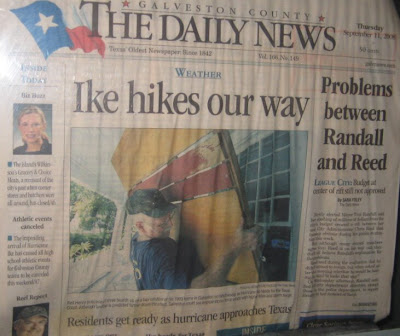On the encouraging side, healthy relief efforts are equally apparent on every part of the island. The greenery killed by salt water is re-emerging and most residents have returned. In stark contrast to the first dramatic photographs published back in September, clean-up crews have erased much of the worst hurricane damage.
Devin and I met at UTMB's main building. The last time we'd both seen that spot, we had been shaky and hobbling, among the many thousands of frightened people amid a sea of emergency vehicles. We'd kept in touch by telephone, email, myspace comments, etc. but there is nothing like being on the island again and being able to talk face-to-face!
The UTMB lobby no longer had a front desk, or furniture, or carpet. Waterline marks stained the walls, and workmen in plastic suits rushed around temporary barriers, backed by cones to keep people out of still-dangerous areas. Many carried tools, cords, mops or crates; one passed me carrying an HP printer. We walked through deserted wings, seeing no people in scrubs running around, no gurneys, no cell phone chatter, no lights on.
We laughed at ourselves for momentarily forgetting which elevator button to press . For heaven's sake, hadn't we spent months there? We argued over whether it was the 5th or 6th floor, and cracked up at our swiss-cheese memories. Upon arrival at the 6th floor Galveston Clinical Research Center (GCRC), we found a small crew and had a happy reunion! We chatted amiably about what we had all been up to since Ike, how glad everyone was to be back at work, rebuilding whatever they had lost, and how relieved they would be when everything was "back to normal."
Devin, our dear Miss Maria, Heather & Deron
Later as I left the building, I wound around toward the hospital cafeteria, which was still closed. Beside the entrance was a machine that held copies of the Galveston County Daily News, the very first newspaper ever published in Texas. I stared at the front, realizing it was not recent. The date at the top right read September 11, 2008. The day we had evacuated. I dropped 50 cents into the coin slot and saw a stack of perhaps 15 papers inside. They were still wet.
The front headline seems ghostly now.

That's the moment that really brought it home for me, in this silent hallway of a once-bustling building. Life had stopped there. The first floor had been under water. I took the top newspaper and spread it out in the back of my SUV. It dried over the past couple of days, and I can almost separate the pages now. It's crusty and moldy and yellow, and I shouldn't keep it, but I can't throw it away.






